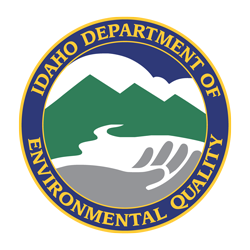DEQ does not directly regulate recycling facilities. Recycling facilities are simply required to operate consistently with what is known as “speculative accumulation” as defined in the “Solid Waste Management Rules” (IDAPA 58.01.06).
This accordion will not appear on the screen
The “Solid Waste Management Rules “prohibit speculative accumulation of stock piles of materials or recyclables that may create a nuisance or have a public health impact. At least 50% of stockpiles of materials or recyclables are to be processed for reuse or disposal by the end of the calendar year after the date of first receipt. Failure to do so results in the facility being deemed an unauthorized solid waste facility, or in cases where the facility is authorized, may result in a citation and monetary penalty.
The Idaho State Department of Agriculture (ISDA) regulates agricultural composting operations when the entirety of the compost stock originates from agricultural wastes. DEQ regulates all other composting facilities and categorizes them under the “Solid Waste Management Rules” by size. Most commercial composting facilities are regulated as Tier II facilities and require DEQ approval of location and facility design. Local public health districts oversee operations. For more information, consult DEQ’s Processing (Composting) Facility Guidance and Checklists for Tier II and Tier III Processing Facilities.
The Waste Tire Disposal Act, Idaho Code § 39-65, limits the number of waste tires that can be on a tire recycling site and requires county authorization and a cash bond to be posted in favor of the county in some cases. More information is found on the Waste Tire web page.
Pollution prevention (P2) is any activity that reduces or eliminates the creation of pollutants or waste at the source. The Pollution Prevention web page provides more information.

